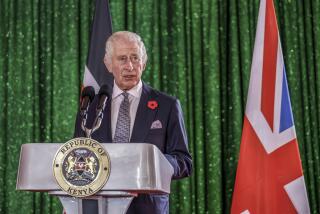Kenya’s Huge Challenge
- Share via
In the Kenyan countryside, roads that were paved are now dirt, overgrown with weeds. Telephone service is abysmal and thieves have stripped many phone lines for their copper. AIDS afflicts at least one in 10 Kenyans, but the government’s plan to deal with it is so feeble that international lenders refuse to advance money, lest it wind up in some functionary’s pockets. Kenyan voters last week said “enough” and turned to the political opposition to lead the nation back toward the prosperity it enjoyed when it won independence from Britain nearly 40 years ago.
The inauguration of Mwai Kibaki on Monday in the capital, Nairobi, was a good gauge of the country’s mood. Crowds booed outgoing President Daniel Arap Moi -- deservedly. Kibaki bluntly and accurately told the people that he was inheriting a nation “badly ravaged by years of misrule and ineptitude.”
The World Bank and the International Monetary Fund froze lending to Kenya because so many top-level government officials and their underlings were ripping off the cash before it could do any good.
Moi’s arrogance extended to picking the man he wanted to succeed him, Uhuru Kenyatta, whose percentage of the vote was half of what Kibaki earned. Kenyatta is the son of Jomo Kenyatta, who led Kenya to independence from Britain in 1963 and was president until his death in 1978, after which Moi moved up from vice president. Corruption and mismanagement drove the economy steadily downhill, and many foreign investors fled rather than pay bribes. In 1963, the average Kenyan earned less than a dollar a day; in 2003, that’s unchanged.
Kenyans have high expectations that Kibaki will work wonders. His first challenge will be ending corruption at the top -- a task that will be made more difficult by what critics charge was his own willingness, as a businessman, to reap the benefits of cronyism when he was part of the Kenyatta and Moi governments. He will then have to ensure that the opposition alliance he hastily formed, the National Rainbow Coalition, works together. Too often, opposition to a common foe -- in this case, Moi -- is the glue that holds ad hoc coalitions together; once in power, they squabble and fall apart.
Kibaki also faces the problem of whether to prosecute Moi and his allies for corruption or follow the South African example of amnesty for those who admit their crimes. But cutting down on corruption -- and eventually ending it -- is the first job, a necessity to make the nation economically healthy.
More to Read
Sign up for Essential California
The most important California stories and recommendations in your inbox every morning.
You may occasionally receive promotional content from the Los Angeles Times.













